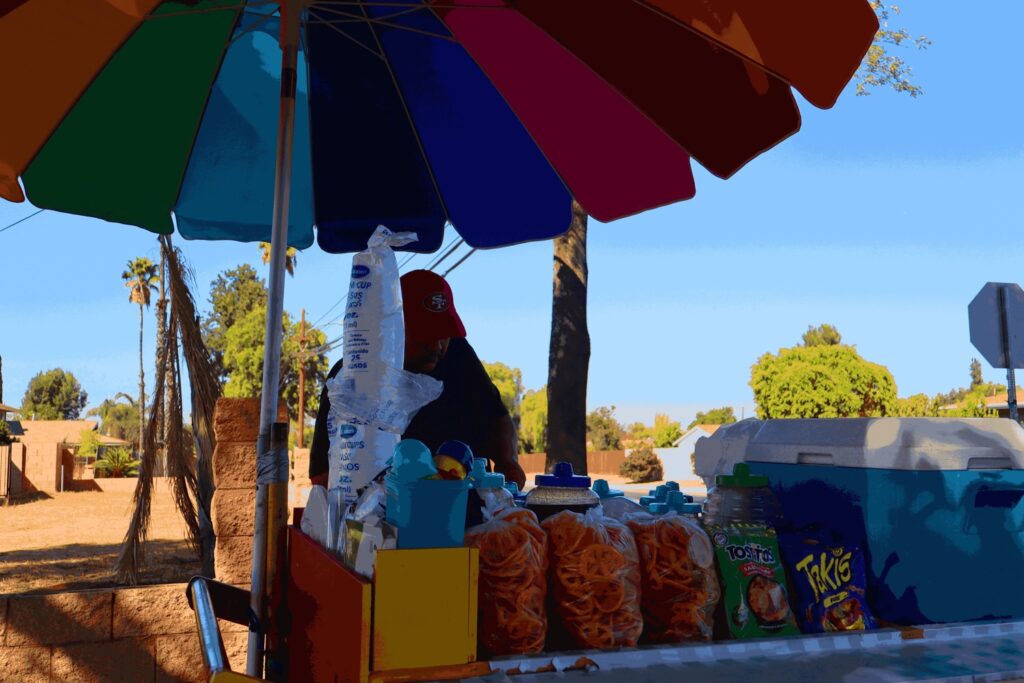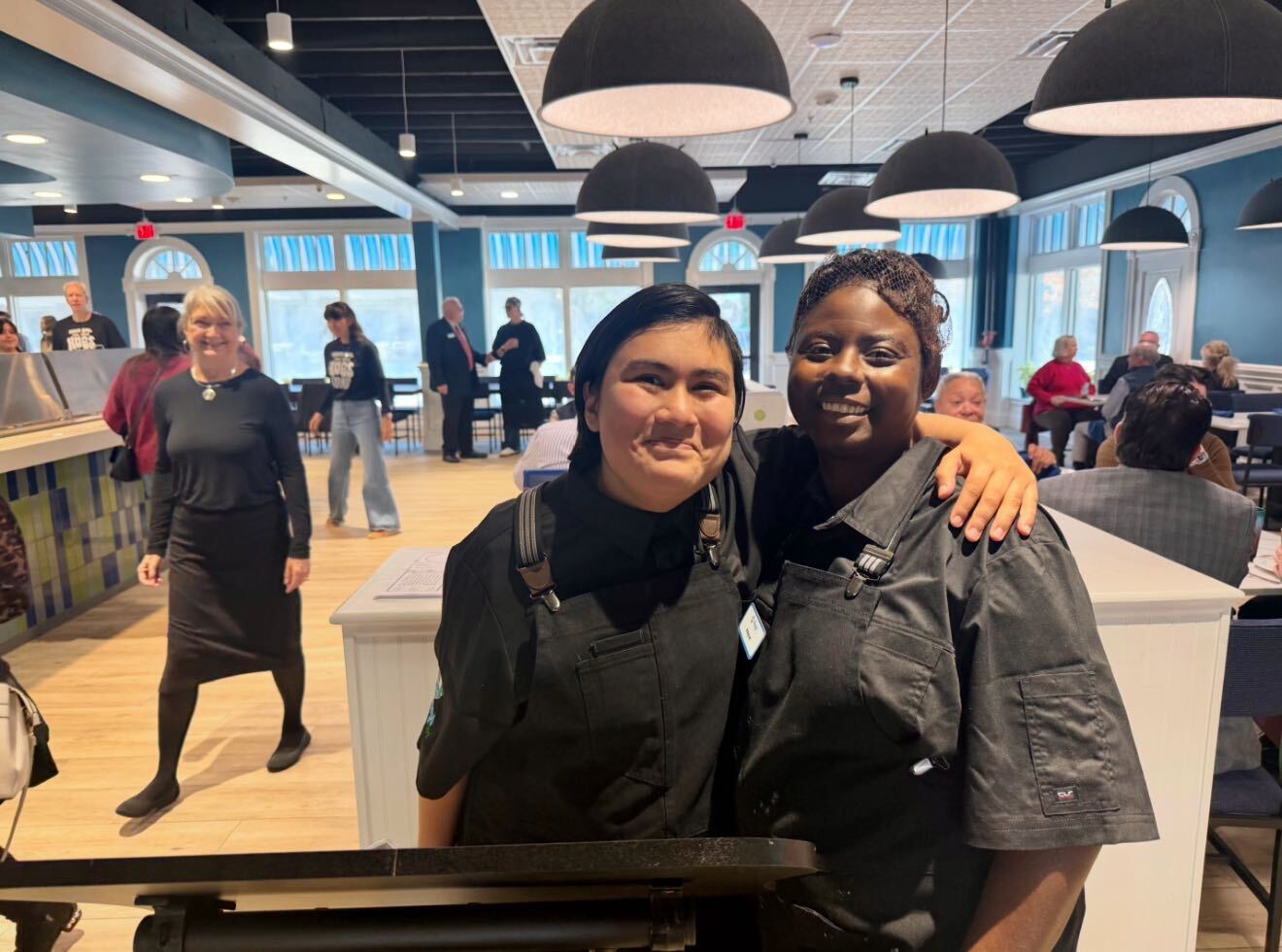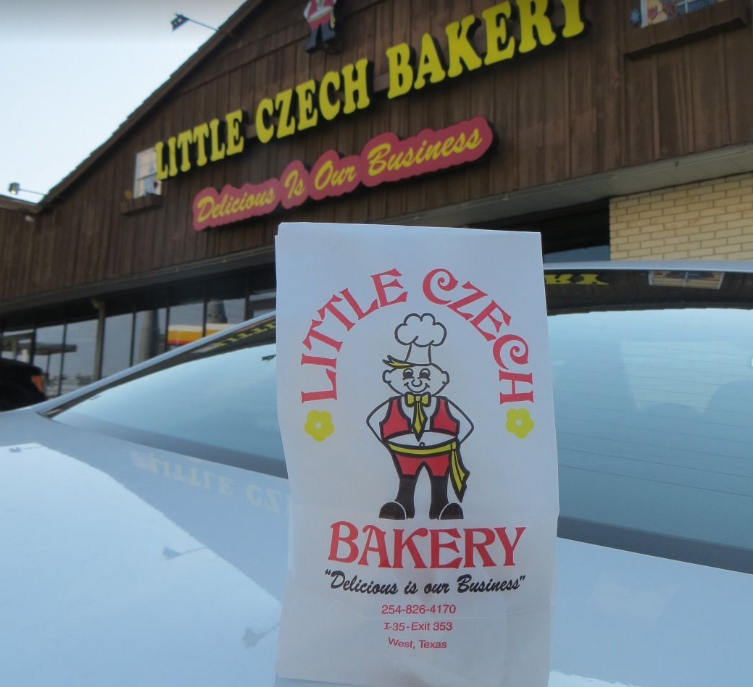December 29, 2024
Categories
Business & Technology, Community, Economy, Food, Health & Science, Immigration
Share
(RIVERSIDE, Calif.) — Every morning before leaving his modest apartment and going to the street to sell corn and Mexican snacks, Mauricio Rivera bows his head and whispers a prayer for protection. For Rivera and dozens of families across Southern California, street vending is not just a job — it’s a lifeline. Yet, for many vendors, each day brings the risk of harassment, confiscations, and even violence, regardless of whether they follow the law.
One morning in October 2023, two Riverside code enforcement officers approached Rivera, 43, as he was setting up his $1,000 vending cart on Lincoln Street in the heart of the city. They told him he was not supposed to sell in that spot and proceeded to discard his entire inventory, dumping his corn into big black trash bags and pouring his mayonnaise and butter cans onto the pavement. Rivera begged them not to take the packed Cheeto chips, but the two men ignored him and took off in their trucks, leaving Rivera with nothing to offer his customers.
“It’s all about having good luck; there are days where the officers are nice, and there are bad days when they act without mercy,” said Rivera, a licensed street vendor, adding that he believes racism is a factor in many of the encounters. “Most Latino officers are respectful, but when the whites or Asians come to inspect my cart, they are rude and yell at me.”
The Cost of Legitimacy
The Riverside County Department of Environmental Health (DEH) said almost 800 street vendors work legally around Riverside County. DEH’s program chief, Jenay Marcotte, pointed out that it is unclear how many street vendors operate without permits, but DEH believes at least 1,000 vendors in Riverside County are working illegally. “Street vending involves people who sell all types of merchandise, not only food, but the food is the one the Environmental Health Department cares more about,” said Marcotte.
While street vending is legal in California, vendors in Riverside County must go through three county offices to sell on the street: the Department of Environmental Health, the Transportation Department, and the Business Registration Certificate Office.
Riverside County states online that the street vending permits cost $79, but street vendors argue that they pay way more upfront.
“When I submitted my application, I paid $180, then I paid $150 to register my business, and one person in the Riverside City Hall gave me an address where I should go buy my vending cart,” said Rivera. When he went to the suggested store, he was surprised by the high prices, ranging from $2,000 to $3,000. “Why are they suggesting expensive places to buy our equipment?” said Rivera, who acquired his vending cart at another store of his choice for $1000.
Chris Pullin, a senior code enforcement officer for the city of Riverside, said the DEH doesn’t care where street vendors buy their vending carts as long as they adhere to the ethical codes stipulated by the county. He also said that vendors without permits can face fines of up to $1,000.
“Our job is not to suggest to sellers where to go and get their tools,” he said. “Our job is to ensure that they are using the right tools to perform their jobs.”
Marcotte said that regardless of what Riverside County agencies advertise online, a street vending permit can cost from $173 to $774, and those permissions need to be renewed annually for the same prices.
Alex Sanchez, 29, drops his four-year-old son at daycare every morning and travels to Riverside from Los Angeles daily to escape street vendor competition. A Los Angeles agency estimates there are 50,000 street vendors scattered across the city. Sanchez said that in Riverside, he feels settled despite making less income. On a good day, he makes $200.
“In Los Angeles, I made $1,500 a week, but I did not have a specific spot to sell my fruit; every day, it was a different location. Police evicted me from any spot by saying that I was causing traffic obstruction,” Sanchez said as he prepared a pineapple-cucumber salad for a customer. “Do you want hot sauce on it?” Sanchez asked the man, who mumbled something and held out a $5 bill that Sanchez didn’t take. “He is homeless, deaf and mute,” said Sanchez while wiping a chopping board.
Despite having dozens of regular customers who stop by his fruit stand daily, Sanchez resents the local authorities’ hypervigilance over street vendors. He said that routine code enforcement and inspections occur three times a week and sometimes several times in one day.
Sanchez recalled an incident one morning when his vending cart was leaking water. Two code enforcement officers investigating the issue disposed of his fruit and coconut water that day.
“I showed them that the temperature was right, the engine was working fine, it was just a thin hose that had just started to leak,” added Sanchez, but the two officers ignored his pleas. The two men dressed in navy blue and khaki uniforms trashed everything.
Sanchez, defeated, loaded his emptied vending cart onto the bed of his Toyota truck and drove back to L.A. without any income.
“The California Retail Food Code gives us authority to impound defective equipment or non-hazardous foods,” said Pullin, who added that in most instances, street vendors refuse to comply with their requests. “Many street vendors don’t follow the rules, so calling ‘the impounding code’ is our last resource,” Pullin said that from Jan. 1 to Nov. 22, code enforcement activated the impounding code 1,213 times.
Navigating Threats and Seeking Allies
Three miles away from Riverside, in the industrial city of Corona, is Edgar Alvarez, 23, a street vendor who makes the daily work trip from Pasadena. Alvarez recalls when he sold fruit and tostilocos around Burbank, Pasadena and Woodland Hills. He said that he was not harassed by authorities but was attacked by civilians.
“I remember once I was selling on a sidewalk in the city of Burbank, and this white man, yelling at me that I was blocking his way, grabbed my vending cart and threw it on the street, almost causing a traffic accident,” Alvarez said.
For Alvarez, the possibility of such attacks remains a constant threat. A year ago, a man with an ax destroyed his brother’s vending cart. After that incident, Alvarez suffered panic attacks so severe that he had to stop vending for two weeks. Soon after, he decided to relocate.
When Alvarez began selling in Corona, the city code enforcement told him that the only legal area for street vending was Cajalco Road, which resulted in little business for him.
“I stayed on Cajalco Road for over a month, but there’s not too much traffic there,” Alvarez said. “I did $80 a day, and sometimes customers took off in their cars without paying for the fruit salads or snacks.” Alvarez now sells his wares on a corner in a predominantly Hispanic neighborhood in Corona.
Cajalco is a hilly, two-lane road that curves and winds over 16 miles. Large crosses and memorials mark spots along the route where several deadly traffic accidents occurred.
“I got my permit, and even when I don’t make as much money as I want in this location, I cannot risk my food truck being impounded,” said food truck owner Michelle as she made tortillas.
Michelle paid $45,000 for her food truck. She said she once got in trouble with code enforcement for street vending in an unauthorized area. The officers confiscated all her prepared taco meat and kitchen utensils. “They took everything — they left the truck empty. I don’t want to go through that again,” Michelle said. It cost $2,500 to repair the officers’ damage to her food truck.
The Riverside County Transportation Department claims that placing the street vendors in remote areas is a safety measure. “Cars drive pretty much bumper-to-bumper in Riverside,” said Valery Sierra, a Riverside County civil engineer. “In addition, there are many construction projects for the next ten years, so we decided to settle the street vendors in the outer areas of the city for their safety.” She added that community complaints about street vendors blocking vehicular traffic were a factor that influenced the decision.
According to Rachel Bottka, a code compliance supervisor for the City of Corona, the most common violations committed by street vendors are selling without a permit on the sidewalk and not having a DEH-issued permit. The Corona Police Department reported that between Jan. 1 and Nov. 14, it received 136 calls from Corona Code Enforcement requesting backup to handle confrontations with street vendors.
“The public would be surprised to know that we received dozens of calls from street vendors complaining about other fellow street vendors who sold merchandise without permission,” said Carmen Guitron, a crime analyst from the Corona Police Department. She noted no records of street vendors being arrested for violations in Corona.
Street vendors say they are a vulnerable field.
“There is no organization looking after us or supporting us,” said Alvarez. “We need a committee that works on our behalf.” He resents the lack of solidarity within the street vendor community.
Early in 2024, the Inland Coalition for Immigrant Justice, an organization that advocates for immigrant rights, introduced a program that provides street vendors with PPE and financial aid and hosts social network workshops and educational classes.
Bryan Sanchez, an ICIJ supervisor and lead organizer, said that it is crucial to support street vendors since they are an overlooked group. ICIJ guides street vendors through the complex process of obtaining vending permits.
“We are trying to build a strong fellowship among street vendors,” said Sanchez, adding that local governments should create more considerate policies regarding street vending. “Most street vendors only make $150 to $200 a day and sometimes code enforcement goes around giving them fines of $1,000. They should fairly give them a written warning the first time.”
Even when street vending is legal, it is a powerless sector lacking logistical organization.
Aldo Castañeda, a paralegal for the Inland Empire Latino Association, said street vendors must speak up when facing abuses perpetrated by code enforcement or civilians. Castañeda clarified that immigration status is irrelevant when serving the Latino community, and the association has a team of attorneys willing to work pro bono when representing minorities.
Alfonso Gonzalez Toribio, a political science professor and director of the ethnic studies department at the University of California, Riverside, said street vendors are easy targets because no syndicate protects them.
“Some street vendors barely speak Spanish, and they are not English speakers; they speak dialects which makes them easy victims for abuse of authority and civilians,” Gonzalez Toribio said. He claimed that even those from the Latino community, which many street vendors belong to, discriminate against street vendors. “I’ve heard many Latinos aspiring to local government positions saying that they want to get rid of street vendors around Riverside.”
Mauricio Rivera said he has conceded that street vending is a job of daily survival and he will continue protecting himself only with his morning prayers. “It’s really upsetting when code enforcement disposes of the fruit and snacks that I buy and prepare with lots of effort. I wish they stop doing that,” he said.


